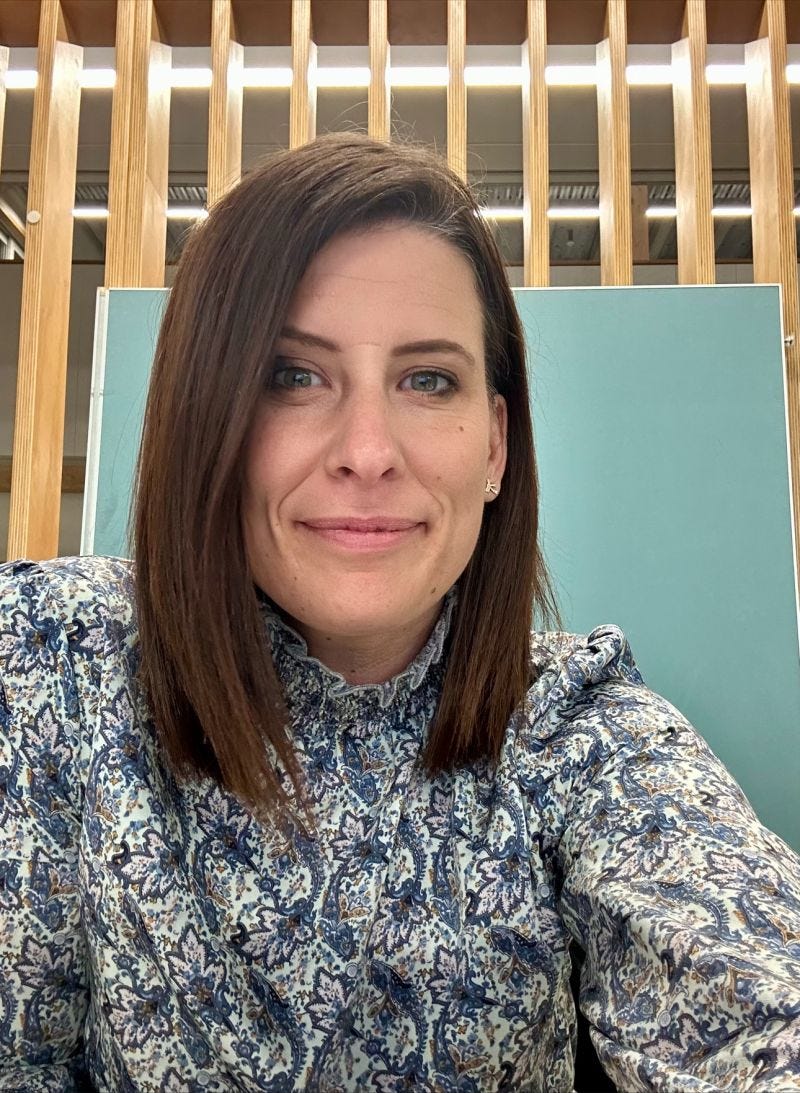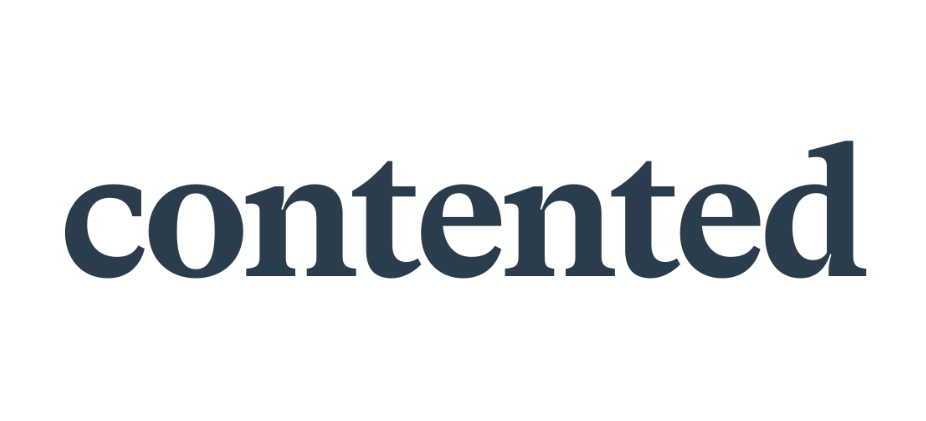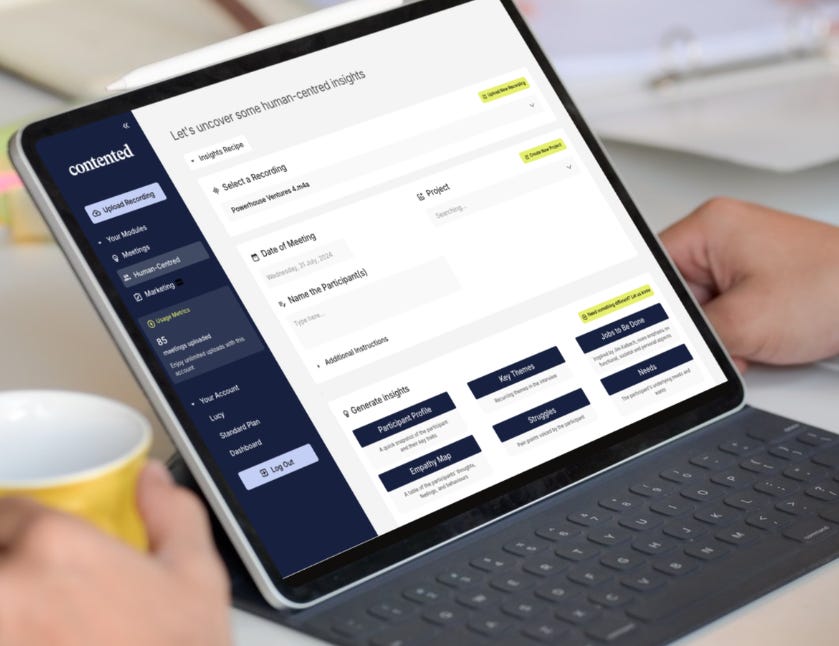70 Coffees in 6 Weeks: How It Changed the Way I View Sales
How ditching the pitch for 70 hours of listening rewired my approach to business.
Hi,
A few weeks ago, I got an email from Hannah Hardy-Jones, co-founder of Contented AI. She wanted to set up a time to chat, and during that conversation she mentioned that she’d recently completed a challenge where she met with 70 people for one-hour conversations over six weeks. No pitching her business or its solutions, just listening and connection.
In a world where we’re constantly being told to optimize, automate, and “convert,” Hannah focused on what people were really saying and feeling beneath the surface. Then, she used Contented, their AI-powered insight platform, to reflect on those conversations afterward, not to replace the human connection, but to deepen it.
The more we talked, the more I became enamored in this genuinely smart and human way to approach business, sales, and product development. So I asked if she’d be willing to write it up, because I think more people need to hear stories like this in a world where listening often gets overshadowed by pitching.
Here’s Hannah’s story. If you like what she has to say, make sure to check out Contented AI. I thought it was a really cool platform, focused on how to use AI to help infuse more humanity into your work.
Last year I set myself a challenge that most would call ambitious (and slightly bonkers): to have 70 one-hour coffee dates in six weeks.
No script.
No pitch.
No immediate ROI.
Just honest conversations with people- some I knew, many I didn’t- about how they work, how they think, and how they talk. But in a very condensed period of time.
At the time, we were trying to figure out how to better shape our product, Contented, a platform that turns conversations into insights. But this wasn’t market research in the traditional sense. It was about something else:
Could stepping back from selling- and leaning into listening- move the needle for our business (and the way I approached sales)?
The idea wasn’t mine originally. It grew out of something I’d witnessed my co-founder Lucy do incredibly well. Before we built Contented, she had created an ethical fashion platform, and her approach was slow and intentional. She didn’t build until she’d spent hours speaking with potential customers, getting underneath the surface and organising her insights afterwards.
I, on the other hand, had been building a mental health tech product that sold well but never really met people’s core needs. I skipped the conversations. I had a strong pitch deck and a shiny brand, but the product itself didn’t start from the ground up and it wasn’t built with the user at the centre. In fact it was based on my own mental health experience which clouded everything I did, and all I wanted to do was sell sell sell.
So, inspired by Lucy (and the book “The Mom Test” by Rob Fitzpatrick), I committed to doing it differently this time.
The Rules of the Challenge
I kept it simple:
70 conversations, 1 hour each
The ideal was an in person meeting but some I conducted online.
I put a call out on LinkedIn and ended up with more that 70 people showing interest and adding their name to a Google form I had hastily put together.
No sales, no slides, no agendas
I used Contented to record and extract insights later
My big focus was on asking better questions
I challenged myself to reflect deeply on the conversation afterwards using our technology.
And for anyone wondering, yes, I drank a lot of coffee. Which eventually turned into tea and then sparkling water.
What Did We Talk About?
I asked every person a version of the same question: “Tell me about the conversations that matter most in your work.”
From there, we explored:
Who do you meet with most? And why?
What do you prepare before the meeting?
How do you take notes?
Are these meetings about money, relationships, decisions or emotions?
What’s annoying about them? Do you have a pain point around them?
What’s magical about your conversations?
Do you have a “burning the house down” problem? Would you pay money for it to go away?
The conversations weren’t always neat or concise, but they were rich. People shared stories of burnout, broken systems, communication gaps, and moments of brilliance they wished they'd captured.
By recording each chat, I could go back later and look for patterns. This was key. Without recording, most of that nuance would have disappeared. In fact if I think about my previous notes I would say all of the nuance would have disappeared.
So, what did I learn? So much, but here are the highlights.
Most people never get asked good questions. We rush through meetings, chase outcomes, and skip the why. When someone asks a thoughtful, open question and then just listens, it’s like an emotional exhale. That’s when the good stuff comes out.
Recording means more presence. Knowing the conversation was being recorded meant I didn’t have to stress about remembering everything. I stopped note-taking. I stopped planning my next sentence. I just listened. I was amazed at how much I enjoyed the interaction without worrying how to capture it, and I accepted my scattered brain more too. This made the conversation feel more human, not less.
Selling is so tempting, but curiosity builds trust and insights. As someone who spends a lot of time in founder-sales mode, it was hard to switch off that reflex. But these chats weren’t about pitching, they were about learning. Ironically, some of the most valuable business relationships came after these chats, when people followed up. Why? Because trust was already built. We did end up getting many customers out of this experiment, but not because I had sold to them during the coffee date.
People want to reflect but rarely get the chance. Many people told me, “No one’s ever asked me that before.” Some used the hour to process ideas they hadn’t said out loud yet. Just having a space to reflect was meaningful. One person said it felt like free therapy. Another called it the best meeting they’d had all month. Not because I was special but because I was actually listening.
Insights don’t arrive. They emerge. It wasn’t one conversation that held the key. It was the collective. After even 15–20, I started to notice themes:
Misalignment between what people think they want from meetings and what they actually use them for.
Decision-making fatigue.
The silent emotional labour of managing conversations.
A desire for deeper connection, not more productivity.
This helped shape our product roadmap, language, and even pricing. And more importantly it made me fall in love with our users and their problems.
It Also Built Something Else: Community
One of the most surprising outcome for me as it created a massive, interlinked web of connections. In Canterbury, where we’re based, everyone knows someone.
Each conversation led to another, like a real-world interpersonal spider web. I started mapping it out and realised: we weren’t just gathering data. We were building community and belonging.
People would say, “You need to meet this person,” or “I’d love to hear what others are saying.” Suddenly, the project had its own momentum. I had people asking to be part of the experiment when they saw the photos on LinkedIn.
Importantly, AI didn’t kill the human connection. It enhanced it.
We used our own tool, Contented, to capture, transcribe, and extract insights from every single chat. Some people assume AI tools make things feel less human.
We would argue the opposite in this case. The technology didn’t generate the words. It gave the words room to breathe and for us to make sense of them.
By offloading the mental admin (note-taking, summarising, remembering), I could show up as a better listener. Less distracted. More present. Less biased. More open.
That’s the kind of “human-first” AI that we believe in at Contented.
Want to Try Your Own Version of This Experiment?
You don’t need to meet with 70 people. Ten is enough. Even five. What matters is the intention.
Here’s how to run your own mini version:
Pick a theme. E.g. “10 people who work in aged care” or “5 freelancers who left corporate life.”
Make it public. Even if it’s just one LinkedIn post. It creates gentle accountability.
Write starter questions. But be willing to ditch them when the real conversation shows up. Don't be too prescriptive.
Record it. With consent. Focus on them- eg “I want to be able to properly listen to you so are you okay with me recording this catch up? I am happy to share the outputs.”
Look for patterns. Don’t just focus on what they say. Watch for tone, rhythm, hesitations.
Share what you learn. Even if it’s messy. Others might see something you missed.
In a world obsessed with scaling, automating, and closing deals faster, this experiment reminded me of something deeply simple:
The best products, and the best relationships, start with conversation.
No shortcuts. No dashboards of leads. Just the act of paying attention.
So here’s your challenge.
Ask someone a better question. Then let them talk. And repeat with the next person.
You will build a better product that way.
If you liked this one, make sure to check out Contented AI.
So, what do you think?
Have you ever stopped selling just to listen—what did you learn?
If you could ask one powerful question in every meeting, what would it be?
What’s a conversation you’ve had recently that changed how you think about your work?
Let us know in the comments.
If you found this interesting, then there are over 850 exclusive posts available behind the paywall, including tons of interviews, courses, books, and more to help you on your author growth journey. You can start exploring with a seven-day trial, or even just give us one tip to show your support.









I loved this article and the deliberate way Hannah went about it. Learnings for every professional here.
Do reckon on using this in some way for fiction?